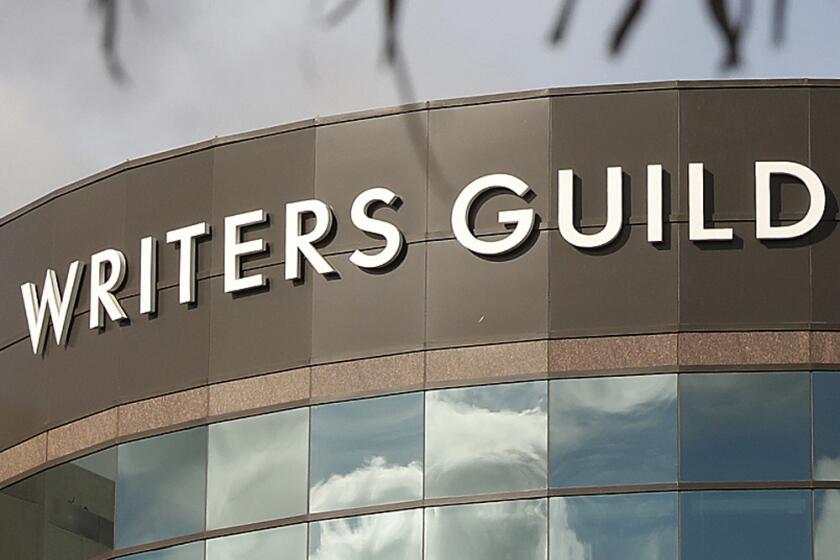WGA’s former President John Wells endorses dissident candidate Phyllis Nagy

- Share via
In a blow to the incumbent leadership of Hollywood’s writers union, John Wells, an executive producer behind shows like “ER” and “The West Wing,” urged fellow writers to vote out key leaders, including its current president in the Writers Guild of America, West, who have led a battle against the industry’s talent agencies.
Wells, a former president of the Writers Guild of America, West, said it was “time to return to the negotiating table” with the Assn. of Talent Agents and do so with new leadership.
In an open letter to guild members, Wells urged members to vote for dissident candidate Phyllis Nagy for president, and endorsed her slate, including secretary-treasurer candidate Nick Jones Jr. and eight people for the board.
WGA West President David Goodman said he has been endorsed by three of the four most recent WGA West presidents Howard Rodman, Chris Keyser and Patric Verrone. He also pointed out he has more experience serving in union leadership positions than Nagy.
“This election is a referendum on the strategy,” Goodman said. “Even though I do feel that the overwhelming majority of members are for this action, if I’m wrong, I will know in two weeks.
Talks between the union and the association have stalled for months on a new code of conduct to replace one that expired this year. In April, the union instructed members to fire agents who did not sign the union’s new agreement.
Hollywood writers and talent agencies are locked in a bitter fight over agency practices, with little progress to show after several negotiating sessions.
One of those practices, packaging — when agencies pull together talent such as writers and actors for projects — has been one of the key issues at stake.
Wells said that packaging practices by the agencies need to be reformed, so writers know how it will affect them. But, he said, at a time when the industry is evolving and studios are moving shows to their own streaming platforms, the terms of those deals are changing.
The amount of money that agencies can make from packaging is “disappearing not accelerating,” Wells said.
Goodman, however, said he believes packaging is not going away and that the changes the union is advocating will benefit writers, including middle- and lower-class writers.
“We took on this fight because we feel that packaging fees created incentive for the agencies to fight for their own money, not for ours,” Goodman said.
“If they were really going away, the agencies wouldn’t be fighting so hard to keep them,” Goodman said
Wells says there are more urgent issues to focus on.
“What’s the point of having packaging points in the ‘profit’ when there won’t be any profits given the way the companies are now planning to use our work?” Wells wrote.
The union’s strategy has caused considerable friction within its membership.
The WGA has negotiated with individual agencies and more than 70 have agreed to the union’s franchise agreement but the union hasn’t signed any of the largest agencies.
Writers who fired their agents who are not part of the union’s franchise agreements have discovered work through their own networks, the guild and the union’s online tools. Those methods have worked for some writers but others have said those options haven’t helped them. Some have gone back to secretly working with their agents.
Nagy, an Oscar-nominated writer (“Carol”), and other members have challenged the current leadership in an election that will be determined on Sept. 16. Hundreds of writers, including prominent showrunners like Shonda Rhimes and Ryan Murphy, expressed their support for Nagy and Jones.
“This agency negotiation, however appropriate and well-considered at [its] inception, now threatens our unity at a time of great peril for the Guild,” Wells said.
The WGA West has also disagreed with the talent agencies on owning or being affiliated with production companies, which the union believes is a conflict of interest. Agencies have said they keep representation and production as separate business entities.
Wells in his letter said the issue of affiliate production is more pressing than packaging.
“This clearly violates their fiduciary responsibilities to act as our agents,” Wells said. “The affiliated content creation companies need to be fully severed from the agencies. This is where our energies in this negotiation must be focused.”
Wells also questioned who would benefit the most if packaging were eliminated and was dubious whether it would result in more money for writers.
“The entire membership is being asked to support the allocation of considerable, invaluable, staff time, legal fees and the associated costs in support of litigation and member mobilization to benefit the most successful members of our Guild,” Wells wrote.
Wells said he wanted the union to negotiate with the ATA, pushing for agents to provide more disclosure on the financial impact of packaging for writers and to ask agencies to divest themselves from affiliated production companies. “This isn’t caving, this is defining clear, and achievable goals in a negotiation,” Wells wrote.
Goodman disagreed with Wells’ letter and said the guild’s strategy to negotiate with individual agencies is working.
He recalled the ATA in a past meeting said the agencies had nothing to do with their affiliate production companies, which Goodman says indicates that there is no way they can get a deal with the ATA on that issue.
“We have seen that there is not going to be any progress in that room with the ATA,” Goodman said. “The only way to make progress is to negotiate with the agencies individually, and we have made a lot of progress doing that.”
Negotiating individually with some talent agencies has in some cases yielded important gains, he said. The franchise agreements require in some cases that agencies send the Writers’ Guild copies of contracts. That information can help the guild protect writers by defending them against late payments and discouraging writers from working for free, Goodman said.
The WGA West and the large talent agencies are also in a heated legal battle in federal court.
Talent agencies WME, UTA and CAA in June and July filed federal lawsuits against the WGA West alleging the union broke antitrust laws when it instructed its members to fire their agents. Last month, the union filed counter claims, alleging the agencies’ practices violate antitrust laws.
The WGA had also filed a state court lawsuit in April against four talent agencies, alleging that the longstanding practice of packaging — pulling together talent for a project and then collecting a fee for it — violated state and federal laws. But last month, the union asked the court to dismiss its suit.
The Writers Guild of America West on Monday dismissed its lawsuit against several talent agencies. The pullback comes as the union faces internal divisions on how it should conduct negotiations with the talent agencies.
The talent agencies have disputed those claims, saying that packaging has been part of an agreement between the union and the talent agencies for more than four decades. The agencies also have said that writers could opt to not be a part of a package and that they benefit from packaging because they don’t have to pay a typical 10% commission fee.
The ATA declined to comment on Wells’ letter.
More to Read
Inside the business of entertainment
The Wide Shot brings you news, analysis and insights on everything from streaming wars to production — and what it all means for the future.
You may occasionally receive promotional content from the Los Angeles Times.












